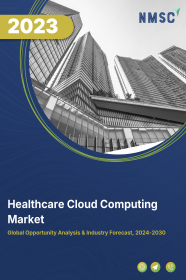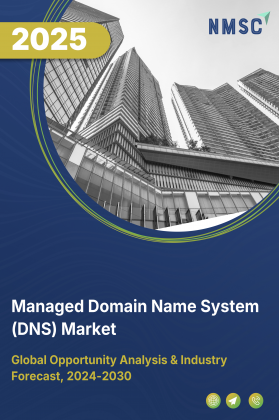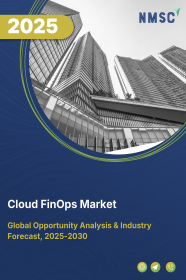
Healthcare Cloud Computing Market by Product (Electronic Medical Records (EMR), Electronic Health Records (EHR), Vendor Neural Archive (VNA), Radiology Information System (RIS), Laboratory Information System (LIS), and Others), by Deployment Model (Private Cloud, Hybrid Cloud, and Public Cloud), by Component (Services and Software), and by End Users (Hospitals and Clinics, Diagnostic Centre, Ambulatory Care Centres, and Others) – Global Opportunity Analysis and Industry Forecast 2024-2030
Market Definition
The global Healthcare Cloud Computing Market size was valued at USD 44.88 billion in 2023 and is predicted to reach USD 131.08 billion by 2030 with a CAGR of 16.6% from 2024-2030. Healthcare cloud computing refers to the use of cloud computing technologies and services within the healthcare industry to store, manage, process, and exchange healthcare-related data and applications. This technology involves the use of remote servers and networks to deliver computing resources, such as storage, processing power, and software applications, over the internet or private networks. Moreover, healthcare cloud computing promotes cost-efficiency by offering flexible payment models. It also enables advanced analytics and AI applications, disaster recovery capabilities, and healthcare-specific solutions.
Market Dynamics and Trends
Growing utilization of cloud computing in healthcare industry for financial facilities among the hospitals and clinics is driving the growth of healthcare cloud computing market. Recently, Genpact and GE Healthcare partnered to streamline and improve the leasing and lending process for GE Healthcare's customers in the U.S. This partnership leverages Genpact's expertise in business process as a service (BPaaS) and its AI-powered platform, Genpact Cora, to provide a scalable and agile solution for GE Healthcare's needs.
Also, increasing adoption of AI-based software tools to optimize the workload for the employees within the hospitals and large healthcare industry is boosting the overall market growth. For instance, August 2023, HCA Healthcare collaborated with Google Cloud to bring generative artificial intelligence (AI) to hospitals in the U.S. It aims to use generative AI technology to improve workflows and reduce the workload of staff in hospitals. Thus, this collaboration between HCA Healthcare and Google Cloud is expected to accelerate the use of AI in hospitals.
Moreover, rising implementation of platform-as-a-service (PaaS) solution among the growing healthcare technology companies for patient management is driving the growth of the market. In early 2023, InterSystems and Pria, a healthcare technology company, partnered to use Health Connect Cloud to improve patient outcomes and streamline at-home care delivery. This solution helps to provide managed healthcare integration cloud services. It supports high-volume transactions, process management, and monitoring for mission-critical applications.
However, downtime in cloud service which disrupt the healthcare operations is restraining the growth of healthcare cloud computing market. On the contrary, combining blockchain technology with cloud computing further enhances the security and traceability of healthcare data and transactions making it a growing factor for healthcare IT innovation. For example, Galvan is a health and wellness blockchain and crypto company that aims to give individuals ownership of their health and wellness through a decentralized blockchain community.
Market Segmentation and Scope of Study
The healthcare cloud computing market report is divided on the basis of product, deployment model, component, end user and region. On the basis of product, the market is categorized into electronic medical records (EMR), electronic health records (EHR), vendor neural archive (VNA), radiology information system (RIS), laboratory information system (LIS), and others. On the basis of deployment type, the market is classified into private cloud, hybrid cloud, and public cloud. On the basis of component, the market is segmented into services and software. On the basis of services, the market is again divided into software as a service (SaaS), platform as a service (PaaS), and infrastructure as a service (IaaS). On the basis of end users, the market is bifurcated into hospitals and clinics, diagnostic centre, ambulatory care centres, and others. Regional breakdown and analysis of each of the aforesaid segments includes regions comprising of North America, Europe, Asia-Pacific, and RoW.
Geographical Analysis
North America held the dominating share of healthcare cloud computing market during the forecast period. This is attributed to factors such as the growing innovations and development towards technological advancement in hospitals and health clinics is driving the growth of the market.
For instance, in April 2023, Cognizant Technology Solutions collaborated with Microsoft Corporation to bring Microsoft cloud-based technology solutions to the healthcare industry. It aims to build an integration roadmap between Cognizant's TriZetto healthcare products with Microsoft Cloud for healthcare. It also provides greater transparency for consumers who can more readily access historical healthcare data, review procedure and services costs, and compare pricing across providers.
Also, rising initiatives by government organizations and healthcare institutes in the developed countries such as the U.S. and Canada for diagnosis and radiology tests, is driving the healthcare cloud computing market growth. For instance, in February 2023, the US General Services Administration (GSA) launched the Applied AI Healthcare Challenge competition aimed at improving healthcare outcomes through the use of AI and related technologies. This challenge intends to assist agencies with the adoption of AI and related technologies to better serve the American people's healthcare system.
On the other hand, Asia-Pacific shows substantial growth in the healthcare cloud computing market share based on the fact that the growing implementation of digital technology such as IoT in the healthcare sector is further driving the global market. For instance, in November 2022, Google Cloud partnered with the Indian government to launch a TeleICU hub at KR Hospital in Mysuru, India. The cloud-hosted platform provides smart capacity and patient management for remote ICUs, connecting ICU healthcare in remote hospitals and improving critical care in Karnataka's state-run hospitals.
Furthermore, growing mobile laboratories developments towards medical healthcare and treatment for people in rural areas of India drives the market growth. For instance, in October 2022, KareXpert helped over 145 healthcare facilities in India transition to the cloud. It is used by leading healthcare providers such as KIMS, Reliance, TTD, HCL, and Apollo, is a cloud-based Hospital Information Management System (HIMS) that offers high security and scalability. KareXpert aims to create a national health ecosystem in India where patients and healthcare stakeholders can access healthcare services digitally.
Competitive Landscape
Various players in the healthcare cloud computing market includes Google LLC, Amazon.com, Inc., IBM Corporation, Amazon Web Services, Inc., Microsoft Corporation, CareCloud, Inc., Siemens Healthcare GmbH, Koninklijke Philips N.V., Athenahealth, Inc., Oracle Corporation, and others. These market players are opting various strategies such as partnership to maintain their dominance in the global market.
For instance, in September 2023, CareCloud partnered with U.S. Physiatry (USP) to provide enhanced healthcare services through comprehensive revenue cycle management and specialized support tailored to USP's unique needs. The collaboration improved communication, streamlined RCM processes, and enhanced efficiency for USP.
For instance, in January 2023, Koninklijke Philips N.V. partnered with Masimo to improve telehealth for patients and clinicians around the world. It aims to augment patient monitoring capabilities in home telehealth applications with the Masimo W1 advanced health tracking watch. The W1 integrates with Philips's enterprise patient monitoring ecosystem to advance the forefront of telemonitoring and telehealth.
Key Benefits
-
The report provides quantitative analysis and estimations of the healthcare cloud computing market from 2024 to 2030, which assists in identifying the prevailing market opportunities.
-
The study comprises a deep-dive analysis of the healthcare cloud computing market including the current and future trends to depict prevalent investment pockets in the market.
-
Information related to key drivers, restraints, and opportunities and their impact on the healthcare cloud computing market is provided in the report.
-
Competitive analysis of the players, along with their market share is provided in the report.
-
SWOT analysis and Porters Five Forces model is elaborated in the study.
-
Value chain analysis in the market study provides a clear picture of roles of stakeholders.
Healthcare Cloud Computing Market Key Segments
By Product
-
Electronic Medical Records (EMR)
-
Electronic Health Records (EHR)
-
Vendor Neural Archive (VNA)
-
Radiology Information System (RIS)
-
Laboratory Information System (LIS)
-
Others
By Deployment Model
-
Private Cloud
-
Hybrid Cloud
-
Public Cloud
By Component
-
Services
-
Software as a Service (SaaS)
-
Platform as a Service (PaaS)
-
Infrastructure as a Service (IaaS)
-
-
Software
By End User
-
Hospitals and Clinics
-
Diagnostic Centre
-
Ambulatory Care Centres
By Region
-
North America
-
The U.S.
-
Canada
-
Mexico
-
-
Europe
-
The UK
-
Germany
-
France
-
Italy
-
Spain
-
Denmark
-
Netherlands
-
Finland
-
Sweden
-
Norway
-
Russia
-
Rest of Europe
-
-
Asia Pacific
-
China
-
Japan
-
India
-
South Korea
-
Australia
-
Indonesia
-
Singapore
-
Taiwan
-
Thailand
-
Rest of Asia Pacific
-
-
RoW
-
Latin America
-
Middle East
-
Africa
-
REPORT SCOPE AND SEGMENTATION:
|
Parameters |
Details |
|
Market Size in 2023 |
USD 44.88 Billion |
|
Revenue Forecast in 2030 |
USD 131.08 Billion |
|
Growth Rate |
CAGR of 16.6% from 2024 to 2030 |
|
Analysis Period |
2023–2030 |
|
Base Year Considered |
2023 |
|
Forecast Period |
2024–2030 |
|
Market Size Estimation |
Billion (USD) |
|
Growth Factors |
Growing utilization of cloud computing in healthcare industry for financial facilities. Increasing adoption of AI-based software tools to optimize the workload for the employees. Rising implementation of platform-as-a-service (PaaS) solution for patient management among the hospitals. |
|
Countries Covered |
28 |
|
Companies Profiled |
10 |
|
Market Share |
Available for 10 companies |
|
Customization Scope |
Free customization (equivalent to up to 80 working hours of analysts) after purchase. Addition or alteration to country, regional, and segment scope. |
|
Pricing and Purchase Options |
Avail customized purchase options to meet your exact research needs. |
Key Players
-
Google LLC
-
Amazon.com, Inc
-
IBM Corporation
-
Amazon Web Services, Inc
-
Microsoft Corporation
-
CareCloud, Inc
-
Siemens Healthcare GmbH
-
Koninklijke Philips N.V.
-
Athenahealth, Inc
-
Oracle Corporation




















 Speak to Our Analyst
Speak to Our Analyst
























